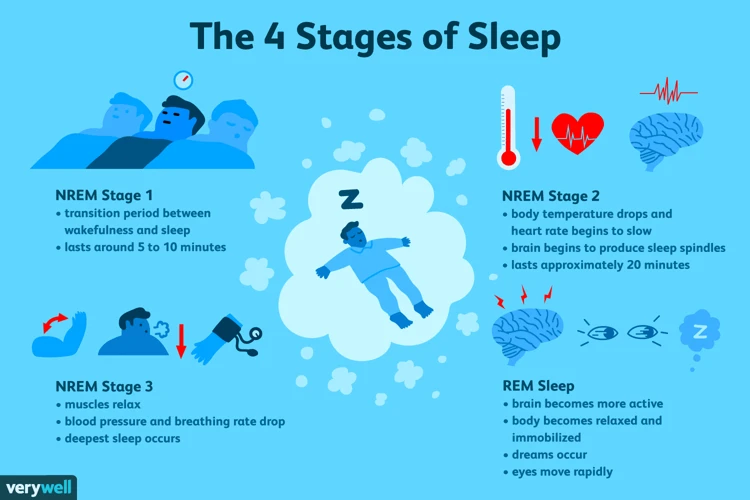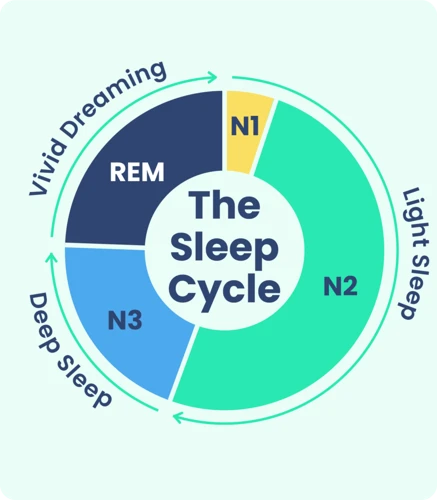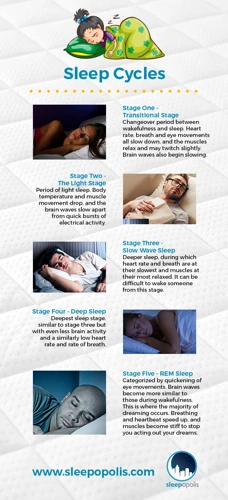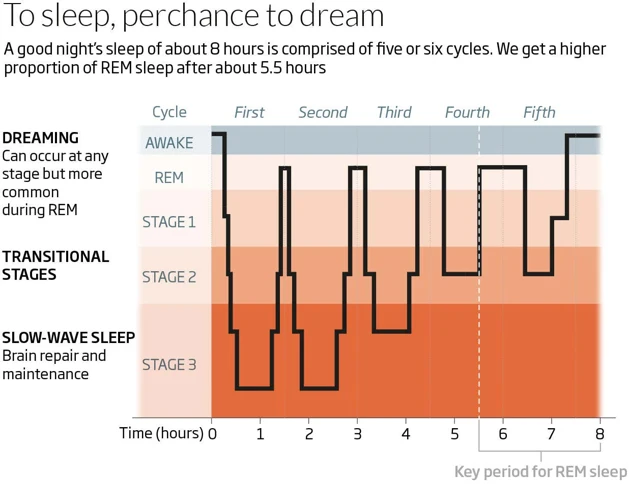Sleep has always been a mysterious aspect of our lives, featuring fascinating phenomena such as dreams, nightmares, and sleepwalking. Among the different stages of sleep, REM (Rapid Eye Movement) sleep stands out as the most enigmatic. During this stage, our brain activity resembles that of being awake, and our eyes move rapidly behind our eyelids, hence the name. While other sleep stages are also important for our physical and mental health, recent research has shed light on the crucial role of REM sleep in various aspects of our well-being, including learning, memory, emotional regulation, and physical restoration. In this article, we will explore the science behind REM sleep, why it is essential for dreaming, and how to improve its quality.
The Science of REM Sleep

Sleep is a complex and vital process for our bodies to function properly. As we sleep, our bodies go through different stages of sleep, each with its own unique features and benefits. One of the most important stages is REM sleep, which stands for Rapid Eye Movement. During this stage, our brain activity increases, and we experience vivid and often intense dreams. But what exactly is REM sleep and why is it so important? Let’s delve into the science behind this fascinating stage of sleep.
What is REM Sleep?
During a night’s sleep, our body goes through different stages of sleep, one of them being REM (Rapid Eye Movement) sleep. REM sleep is a stage of sleep characterized by rapid eye movement, increased brain activity, and muscle relaxation. During this stage, our brain becomes more active than in any other sleep stage, causing high-frequency, low-amplitude brain waves that resemble those when we are awake.
REM sleep usually occurs about 90 minutes after you fall asleep and it lasts for around 20-25% of your entire sleep cycle. As the name suggests, during this stage, our eyes move rapidly in different directions, and our body becomes more relaxed, almost paralyzing our muscles.
REM sleep is an essential part of the sleep cycle, as it serves many important functions. One of the most critical roles of REM sleep is to help us process and consolidate memories. During this stage, our brain processes the information we received throughout the day and consolidates it, which helps to form long-term memories.
REM sleep is crucial for brain development and growth in infants and young children. Studies have shown that babies spend most of their time in REM sleep, which is believed to help strengthen the connections between neurons in the brain, leading to cognitive and intellectual development.
Overall, REM sleep is a vital stage of the sleep cycle that serves many important functions, including memory consolidation and brain development, and its disruption can have negative consequences on our health and wellbeing.
How Does REM Sleep Affect Dreaming?
During REM sleep, the brain experiences a flurry of activity, which leads to vivid dreaming. REM sleep is characterized by rapid eye movement, irregular heart rate, and shallow breathing. Here are some ways in which REM sleep impacts dreaming:
- Increased Brain Activity: During REM sleep, the brain activity increases to levels similar to being awake. This increase in activity is associated with heightened emotions, creativity, and memory consolidation.
- Activation of the Limbic System: The limbic system is the part of the brain responsible for emotions, motivations, and memory formation. During REM sleep, the limbic system is highly active, leading to vivid emotional dreams.
- Paralysis of Muscles: During REM sleep, the body is effectively paralyzed to prevent acting out dreams. This paralysis is caused by the release of neurotransmitters that inhibit muscle movement.
- Memory Consolidation: REM sleep is crucial for consolidating memories and forming long-term memories. When we sleep, the brain processes and consolidates memories, making them easier to access later on.
- Creativity and Problem-Solving: REM sleep is associated with improved problem-solving skills and creativity. Dreams that occur during REM sleep have been shown to incorporate abstract thinking and insights that we may not have had while awake.
The impact of REM sleep on dreaming is significant. It allows for emotional processing, memory consolidation, and creativity. It also plays an important role in our overall mental health and well-being.
Why REM Sleep is Important for Learning and Memory

During REM sleep, the brain experiences a surge of activity that is beneficial for both learning and memory consolidation. Memory consolidation is the process by which information is transferred from short-term memory to long-term memory, and studies have shown that REM sleep is critical for this process to occur.
During REM sleep, the brain is intensely active as it sorts through the day’s events, filtering out irrelevant information and consolidating important memories. This is achieved through the activation of a network of brain regions that are responsible for memory consolidation, known as the default mode network.
Additionally, REM sleep is important for learning. During this stage of sleep, the brain replays and practices newly acquired skills and information, strengthening the neural pathways associated with these tasks.
Research has shown that people who experience more REM sleep generally have better memory performance and are more adept at learning new things. Conversely, sleep deprivation can significantly impair both memory consolidation and learning abilities.
It is important to ensure that you are getting enough quality REM sleep each night to support optimal cognitive functioning. This not only includes getting adequate sleep but also establishing healthy sleep habits and avoiding factors that disrupt REM sleep.
The Connection Between REM Sleep and Emotional Health

During REM sleep, the brain is actively processing emotions and experiences from the day before. Studies have shown that REM sleep plays a crucial role in regulating emotional responses and promoting emotional health.
During this stage of sleep, the amygdala, which is responsible for processing emotional information, becomes more active. The prefrontal cortex, which controls decision-making and problem-solving, also becomes more active during REM sleep. This increased activity allows the brain to process and regulate emotions, which can help reduce the risk of developing mood disorders such as depression and anxiety.
Additionally, REM sleep helps with memory consolidation, allowing the brain to replay and strengthen emotional memories, making them more accessible during waking hours. This process can help individuals process difficult emotions and experiences, leading to better emotional resilience and overall emotional health.
However, REM sleep deprivation can have negative effects on emotional health. Research has shown that individuals who are chronically deprived of REM sleep are more likely to experience emotional instability, irritability, and aggressive behavior.
There is a strong connection between REM sleep and the processing of trauma. REM sleep allows individuals to process and consolidate traumatic memories, making it an important factor in the treatment of post-traumatic stress disorder (PTSD).
It is important to prioritize getting quality REM sleep to maintain emotional health and prevent mood disorders.
The Physical Benefits of REM Sleep

As if we needed more reasons to prioritize getting enough sleep each night, research shows that a particular stage of sleep known as REM sleep is crucial for numerous physical benefits. From restoring the body to maintaining hormonal balance, REM sleep is an essential component of overall health and wellbeing. In this section, we will delve into the various ways REM sleep supports our physical health, as well as the consequences of not getting enough of it.
REM Sleep and Physical Restoration
During REM sleep, the body experiences physical restoration. This is a crucial stage in the sleep cycle where the body repairs and rejuvenates itself. Here are some of the physical benefits of REM sleep:
- Increased Muscle Relaxation: During REM sleep, the body experiences a state of muscle paralysis, which allows for increased muscle relaxation. This is beneficial for athletes or individuals who engage in physical activity as it enhances muscle recovery and prevents injury.
- Improved Pain Tolerance: REM sleep has been shown to increase pain tolerance. This can be particularly helpful for individuals who suffer from chronic pain conditions.
- Enhanced Immune System: REM sleep plays a vital role in strengthening the immune system. During this stage, the body produces cytokines, which are essential for fighting off infections and diseases.
- Decreased Inflammation: REM sleep has also been linked to decreased inflammation in the body. Chronic inflammation is a known contributor to a range of health issues, such as heart disease and cancer.
Getting enough quality REM sleep is important for physical restoration and overall health. It is recommended that adults aim for 7-9 hours of sleep per night, with a significant portion of that time spent in REM sleep.
REM Sleep and Hormonal Balance
During REM sleep, our body goes through hormonal changes that are important for the balance of our hormones. Research has shown that a lack of REM sleep can have negative effects on hormone levels, resulting in a wide range of health problems. Here are some ways REM sleep affects our hormonal balance:
- Growth Hormone:During REM sleep, growth hormone is released in higher quantities than during any other stage of sleep. This hormone is important for the growth and repair of tissues, as well as bone density.
- Testosterone: REM sleep plays a vital role in maintaining healthy testosterone levels. Testosterone is important for sexual function, muscle growth, and bone health. Lack of REM sleep can result in decreased testosterone levels, leading to a range of health problems.
- Cortisol: Cortisol is also affected by REM sleep. Cortisol is a hormone that is released in response to stress. During REM sleep, cortisol levels decrease, allowing the body to relax and recover from the physical and mental stresses of the day.
- Thyroid Hormone: REM sleep is important for maintaining healthy thyroid hormone levels. The thyroid is responsible for regulating metabolism, growth, and development. A lack of REM sleep can result in a decrease in thyroid hormone levels, leading to sluggishness, weight gain and other health problems.
REM sleep plays a vital role in maintaining hormonal balance, which is necessary for overall health and well-being. It is important to prioritize sufficient and quality REM sleep to ensure that our hormones are well-regulated.
The Negative Effects of REM Sleep Deprivation

Sleep is essential for our overall health and well-being, and its importance cannot be overstated. While all stages of sleep are crucial, REM sleep is particularly important for dreaming and cognitive processes. However, the negative effects of REM sleep deprivation are often overlooked. REM sleep deprivation can have serious consequences for both mental and physical health, leading to insomnia, mood disorders, and even a weakened immune system. It is essential to understand the consequences of REM sleep deprivation in order to prioritize a healthy sleep routine and achieve optimum health.
Insomnia and Sleep Disorders
One of the negative effects of REM sleep deprivation is the development of insomnia and other sleep disorders. Insomnia is a sleep disorder characterized by persistent difficulty falling asleep or staying asleep. People with insomnia may feel tired or irritable during the day, have trouble concentrating, and may experience other negative consequences such as a decline in work or school performance.
Sleep disorders such as obstructive sleep apnea and narcolepsy can also impair REM sleep, leading to negative effects on overall health and well-being. Obstructive sleep apnea is a condition in which a person’s airway becomes obstructed during sleep, causing brief pauses in breathing and disrupted sleep. This condition may lead to daytime sleepiness, fatigue, and an increased risk of cardiovascular problems.
Narcolepsy is a neurological condition that affects a person’s ability to regulate sleep-wake cycles. People with narcolepsy may experience excessive daytime sleepiness, sudden episodes of falling asleep during the day, and symptoms of REM sleep intrusion such as sleep paralysis and hallucinations.
According to research studies, REM sleep disruption has also been linked to an increased risk of developing mental health disorders such as depression and anxiety. Chronic sleep deprivation has been associated with a higher likelihood of developing mood disorders, and REM sleep disruption may play a role in this association.
The negative effects of REM sleep deprivation on both mental and physical health highlight the importance of ensuring adequate and quality sleep. Establishing a regular sleep routine and taking steps to improve sleep hygiene can contribute to better sleep and overall well-being.
Impact on Mental and Physical Health
REM sleep deprivation can have a significant impact on both mental and physical health. Here are some of the potential negative effects of not getting enough REM sleep:
- Impaired cognitive function: REM sleep is important for consolidating memories and learning new information. Without enough REM sleep, your ability to concentrate, remember things, and learn new things can be affected.
- Poor mood regulation: REM sleep is also essential for emotional regulation. When you don’t get enough REM sleep, you may be more likely to experience mood swings, irritability, and difficulty managing stress.
- Inability to cope with stress: REM sleep is important for regulating the body’s stress response. When you don’t get enough REM sleep, you may find it harder to cope with stressful situations, and may be more likely to develop anxiety or depression.
- Increased risk of physical illness: REM sleep is important for the body’s immune function. When you don’t get enough REM sleep, your immune system may not function properly, which can increase your risk of developing illnesses and infections.
- Increased risk of obesity: REM sleep is important for regulating hormones that control appetite and metabolism. Without enough REM sleep, you may be more likely to overeat and gain weight.
- Increased risk of injury: REM sleep is important for maintaining motor skills and coordination. When you don’t get enough REM sleep, you may be at increased risk of accidents and injuries.
It’s important to prioritize getting enough quality REM sleep to maintain not only cognitive and emotional health, but also physical health.
How to Improve Your REM Sleep
If you’re struggling with getting enough REM sleep, don’t despair! There are several ways to improve the quantity and quality of your REM sleep, which can lead to better overall health and well-being. By making a few adjustments to your daily routine and bedtime habits, you can increase the chances of hitting that crucial REM cycle each night. Here are some helpful tips and strategies to try out:
Establish a Regular Sleep Routine
To improve your REM sleep, it’s important to establish a regular sleep routine. That means going to bed and waking up at the same time every day, even on weekends or days off. This can be challenging at first, but your body will eventually get used to the routine and start to naturally feel sleepy and alert at the appropriate times.
Creating a sleep routine can also involve other sleep-promoting habits, such as avoiding heavy meals, caffeine, and alcohol before bedtime. It’s also important to create a sleep-conducive environment, which includes keeping your bedroom cool and dark, and minimizing noise and disruptions.
Here’s an example table outlining some tips for establishing a regular sleep routine:
| Tips for Establishing a Regular Sleep Routine |
|---|
| Go to bed and wake up at the same time every day |
| Avoid heavy meals, caffeine, and alcohol before bedtime |
| Keep your bedroom cool and dark |
| Minimize noise and disruptions in your sleep environment |
By establishing a regular sleep routine, you can improve your overall sleep quality and increase the amount of time you spend in REM sleep. This can lead to better cognitive function, emotional regulation, and physical health.
Avoid Sleep Disruptors
In order to improve the quality of your REM sleep, it’s important to avoid sleep disruptors that can interfere with your ability to enter this crucial stage of sleep. Some common sleep disruptors to be aware of include:
| Caffeine: | Consuming caffeinated beverages such as coffee, tea, or soda during the day can interfere with your ability to fall asleep and may also affect the quality of your sleep. It’s best to avoid caffeine within several hours of bedtime. |
| Alcohol: | While alcohol may help you fall asleep initially, it can disrupt the quality of your sleep and make it more difficult to enter the REM sleep stage. It’s best to limit your alcohol intake or avoid it altogether, especially close to bedtime. |
| Nicotine: | Nicotine is a stimulant that can make it difficult to fall asleep and stay asleep. If possible, avoid smoking or using nicotine products before bedtime. |
| Screen Time: | The blue light emitted from electronic devices such as TVs, smartphones, and tablets can interfere with your circadian rhythms and make it more difficult to fall asleep. It’s best to avoid screen time for at least an hour before bed, or alternatively, use devices with a blue light filter or wear blue light blocking glasses. |
| Noise: | Excess noise can interfere with your ability to fall asleep and stay asleep. Consider using earplugs or a white noise machine to block out external noise and create a more peaceful sleeping environment. |
| Stress: | Stress can make it difficult to fall asleep and may also cause you to wake up during the night. Practice stress-reducing techniques such as meditation, deep breathing, or yoga to help you relax and fall asleep more easily. |
By avoiding these sleep disruptors and making healthy lifestyle choices, you can improve the quality of your sleep and ensure that you’re getting the crucial REM sleep that your body and mind need for optimal functioning.
Practice Relaxation Techniques
One effective way to improve REM sleep is by practicing relaxation techniques. Here are some proven techniques that can help you achieve deep relaxation and promote better REM sleep:
- Deep Breathing. Taking deep, slow breaths can help reduce stress and promote a sense of calm. You can practice deep breathing exercises before bed or incorporate them into your daily routine.
- Meditation. Meditation is a mindfulness practice that involves focusing on the present moment and clearing your mind of distractions. Regular meditation has been shown to improve sleep and increase REM activity.
- Yoga. Yoga combines physical postures with breathing exercises and relaxation techniques. Practicing yoga regularly has been linked to better sleep quality and increased REM sleep.
- Progressive Muscle Relaxation. This technique involves tensing and then relaxing each muscle group in your body, one at a time. Progressive muscle relaxation can help reduce muscle tension and promote relaxation.
- Aromatherapy. Using certain essential oils, such as lavender or chamomile, can help promote relaxation and improve sleep quality.
By incorporating these relaxation techniques into your daily routine, you can improve your overall sleep quality and increase the amount of REM sleep you get each night. It’s important to note that it may take some time to see the benefits of these techniques, so be patient and consistent with your practice.
Conclusion
In conclusion, it is clear that REM sleep plays a crucial role in our physical and mental health. During this stage, our brains are highly active, and we experience vivid dreams that are essential for various cognitive functions, including learning and memory consolidation.
Moreover, REM sleep is closely linked to emotional regulation, and it helps us process and cope with intense emotions. Getting enough REM sleep is also important for physical restoration, as it promotes healing and repairs tissue damage.
On the other hand, REM sleep deprivation can have negative consequences, such as insomnia and sleep disorders, and can negatively impact both our mental and physical health.
To improve your REM sleep, it is essential to establish a regular sleep routine, avoid sleep disruptors, and practice relaxation techniques. By taking steps to prioritize REM sleep, we can experience the numerous benefits it offers.
Overall, understanding the importance of REM sleep and taking action to optimize it can have a significant impact on our overall well-being and quality of life. So, prioritize your REM sleep and see the positive changes it brings to your life!
Frequently Asked Questions
What happens during REM sleep?
During REM sleep, your brain is active while your body is paralyzed, and this is when most dreaming occurs.
How long does a typical REM sleep cycle last?
A typical REM sleep cycle lasts for about 90-120 minutes, and it recurs several times throughout the night.
What are some of the benefits of REM sleep?
REM sleep is important for learning and memory consolidation, emotional regulation, and physical restoration.
What happens if you don’t get enough REM sleep?
If you don’t get enough REM sleep, you may experience negative effects on your mental and physical health, including mood disturbances, memory problems, and impaired immune function.
What are some ways to improve your REM sleep?
You can improve your REM sleep by establishing a regular sleep routine, avoiding sleep disruptors, and practicing relaxation techniques.
What are some common sleep disruptors?
Common sleep disruptors include caffeine, alcohol, nicotine, and electronic devices with blue light emissions.
What are some relaxation techniques that can improve REM sleep?
Relaxation techniques like meditation, deep breathing, and progressive muscle relaxation can help improve REM sleep.
How much REM sleep do you need?
Adults need about 90-120 minutes of REM sleep per night, and this typically accounts for about 20-25% of total sleep time.
What are some natural ways to promote REM sleep?
Natural ways to promote REM sleep include getting regular exercise, exposing yourself to natural light during the day, and avoiding large meals before bedtime.
What are some signs that you may not be getting enough REM sleep?
Signs that you may not be getting enough REM sleep include feeling tired or sluggish during the day, having trouble concentrating, and experiencing mood swings or irritability.








